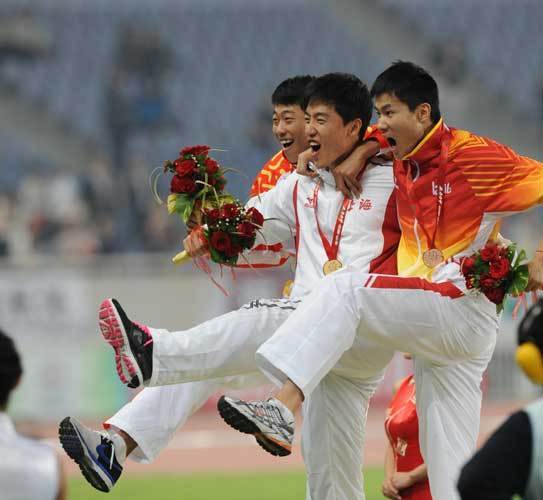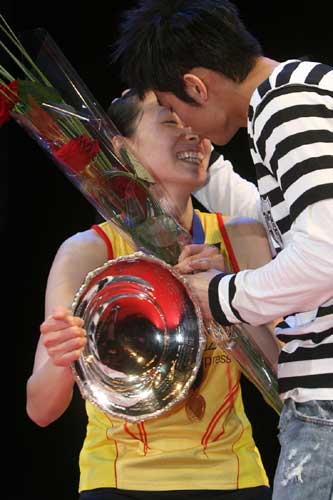Stars
New breed: China's stylish new winners
(China Daily)
Updated: 2011-06-19 08:37
 |
Large Medium Small |
 |
|
Hurdler Liu Xiang (middle) and fellow athletes Ji Peng (left) and Shi Dongpeng celebrated with a victory dance on the podium during China's National Games in 2009. [Provided to China Daily] |
Li, dubbed "International Li" by fans, is seen as the paragon of a new, improved breed of Chinese athletes who are not afraid to let their personalities shine through.
They are more able to express themselves, and add a human face to their achievements and performances.
Among them, Olympic champion shuttler Lin Dan and hurdler Liu Xiang were among the first to show more expressive personalities.
 |
|
Shuttler Lin Dan and fellow shuttler and girlfriend Xie Xingfang shared an intimate moment during the 2007 All-England Championships, much to the delight of fans. [Provided to China Daily] |
The world will also remember how Liu Xiang's exuberant leap onto the winner's podium after his dramatic victory of the men's 110m hurdles race at the 2004 Athens Olympics.
But, before Li Na burst onto the scene, no one embodied the image of the Chinese sportsman abroad more than NBA all-star center Yao Ming.
He single-handedly changed the image of Chinese athletes abroad with his humility, modesty, social responsibility and smart thinking coupled with his stellar performances on the court. He became an unofficial ambassador for China, and did much to promote Sino-American cultural exchange.
"Yao has such a huge impact because he is so real. He has truly shown what he is, both on and off the court. That had made the Americans accept him," says Lu Hao, Yao's agent.
It was not always so.
Lu, who is also manages sports agency, Starz International Sports, remembers when he himself was a young basketball player.
"At that time, athletes were more like state symbols. They were careful to appear the same off the court. They wore the same uniforms, had the same hairstyles and even uniform answers to media questions," Lu tells China Daily. "Self-expression was the last thing that was encouraged."
Lu attributes this to the immaturity of sports in the country then, and also limited international exposure.
"Life was simple and knowledge was limited. Players were not willing to express their opinions because they had little to say.
"But we are in the information age. With modern media outlets, athletes have more access to better understand the world and to enrich their personalities. Frequent international exchange has made them more open," says Lu, whose company also manages China snooker sensation Ding Junhui.
Aware of the potency of star power, Lu's company has tried hard to help its sports celebrities manage public attention better.
"We arrange for them to take lessons on how to handle media interviews. We also try to influence them indirectly by building up their personalities," Lu says, citing Ding's success as an example.
The 24-year-old snooker champion used to be a quiet person too shy to talk with strangers when he claimed the 2002 World Under-21 Championship at 15, the youngest winner ever.
Starz organized visits and tours to the United Kingdom for him, where he trained and improved his general knowledge. The company also introduced him to a wider social circle, including dinner parties with celebrities so the young man could improve his social skills.
The results speak for themselves. Last year, Ding was part of a team of four international Chinese sports personalities, including Yao Ming, who took part in an image branding film for China that was telecast by CNN and shown in Times Square in New York.
"We would like our athletes to shine, to draw more eyeballs and help us in our marketing," Lu says.
| 分享按鈕 |